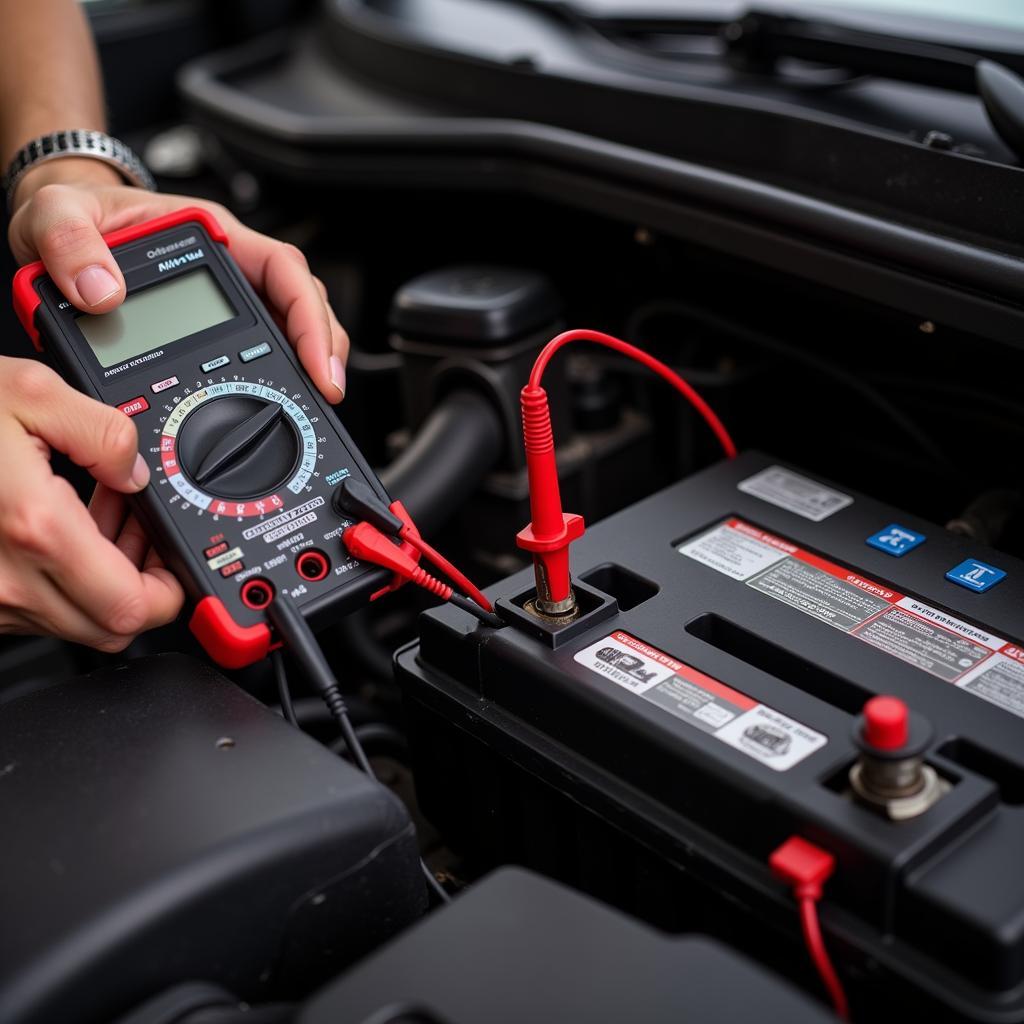If your car keeps running out of battery, it can be a frustrating and inconvenient experience. This problem can stem from a variety of issues, from a simple loose connection to a more complex electrical fault. This guide will delve into the common causes, diagnostic techniques, and solutions for a car battery that constantly drains. We’ll also cover preventative measures and offer expert advice to help you keep your car running smoothly. new battery wont hold charge if you recently replaced it.
Why Does My Car Battery Keep Dying?
A car battery’s primary function is to start the engine. Once the engine is running, the alternator takes over, powering the electrical systems and recharging the battery. So, if your car keeps running out of battery, there’s a disruption in this cycle. This could be due to a failing battery, a parasitic drain, a faulty alternator, or even extreme weather conditions.
Understanding the Culprits: Common Causes of Battery Drain
-
Failing Battery: Over time, batteries lose their ability to hold a charge. This is a natural process exacerbated by extreme temperatures and deep discharges. If your battery is over three years old, it might be the prime suspect.
-
Parasitic Drain: This refers to a continuous draw of power even when the car is off. Common culprits include interior lights left on, faulty door switches, and aftermarket accessories improperly installed.
-
Faulty Alternator: The alternator is responsible for recharging the battery while the engine is running. A malfunctioning alternator won’t charge the battery properly, leading to repeated draining.
-
Extreme Temperatures: Both extreme heat and cold can significantly impact battery performance. Heat can evaporate battery fluid, while cold can slow down the chemical reactions within the battery, reducing its capacity.
Diagnosing the Problem: How to Find the Battery Drain Culprit
Identifying the exact cause of the battery drain requires systematic troubleshooting. You can start by performing some simple checks yourself.
- Visual Inspection: Check the battery terminals for corrosion. Clean them with a wire brush and baking soda solution if necessary.
- Battery Test: Use a multimeter to test the battery voltage. A fully charged battery should read around 12.6 volts.
- Parasitic Drain Test: With the car off and all accessories turned off, disconnect the negative battery cable and connect an ammeter in series. A reading higher than 50 milliamps indicates a parasitic drain.
 Testing car battery with multimeter
Testing car battery with multimeter
How to Prevent Your Car Battery from Dying
Preventing a dead battery involves regular maintenance and mindful usage. Here are a few tips to keep in mind:
- Regular Battery Testing: Test your battery every few months, especially during extreme weather conditions.
- Limit Short Trips: Short trips don’t give the alternator enough time to fully recharge the battery.
- Turn Off Accessories: Make sure all lights, radio, and accessories are off when the car is parked.
- Properly Installed Aftermarket Accessories: Ensure any aftermarket accessories are correctly installed to avoid parasitic drains.
“A well-maintained battery is crucial for a reliable vehicle. Regular checks and mindful usage can significantly extend its lifespan,” says John Smith, Automotive Electrical Engineer at AutoTech Solutions.
Solutions for a Car That Keeps Running Out of Battery
Once you’ve identified the cause, there are various solutions, depending on the problem.
Replacing the Battery
If the battery is failing, replacing it is the most straightforward solution. charged car battery but dies again suggests a failing battery. Choose a battery that matches your car’s specifications.
Fixing a Parasitic Drain
If a parasitic drain is the culprit, identifying and eliminating the source is key. This may involve checking fuses, relays, and wiring for faults. car is draining battery provides more detailed information on this topic.
Repairing or Replacing the Alternator
If the alternator is faulty, it needs to be repaired or replaced. A qualified mechanic should diagnose and fix this issue. If you experience lights flickering in car won t start, your alternator might be failing.
Conclusion
A car that keeps running out of battery can be a sign of various underlying problems. By understanding the potential causes and employing proper diagnostic techniques, you can effectively address the issue and prevent future occurrences. Regular maintenance and mindful driving habits are key to keeping your car battery healthy and your journeys uninterrupted. If you suspect a problem with your car’s electrical system, especially if your car radio wiring guide was used for aftermarket installation, consult a qualified mechanic for a thorough inspection.
